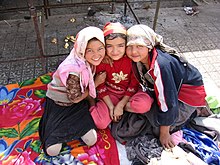Child
This article needs additional citations for verification. (December 2007) |


The term child (plural: children) varies according to time and place, as well as to the discourse (legal, psychological, biological, religious) in which the term is used. It typically refers to one's state or age.[1] Thus it may signify a human being between birth and puberty, or refer to one who is childish or immature. It may also refer to one's relationship with a parent or authority figure. Thus it may signify group membership in a clan, tribe, or religion; or it can signify being strongly affected by a specific time, place, or circumstance, as in "a child of nature" or "a child of the Sixties."[2] The term can also be applied to non-human offspring, as in the child node of a tree.
Legal definition
The legal definition of "child" varies from government to government, and has varied over time within the same government. It is interchangeable with minor.
The United Nations Convention on the Rights of the Child defines a child as "every human being below the age of 18 years unless under the law applicable to the child, majority is attained earlier".[3]
Connotations
Some organisations working with teenagers - such as schools or youth clubs - prefer the terms 'young person', or 'young adult', as they believe that these terms show greater respect towards people under nineteen.[citation needed]
Attitudes toward children

Social attitudes toward children differ around the world, and these attitudes have changed over time. One study has found that children in the United States are coddled and over-protected.[4] A 1988 study on European attitudes toward the centrality of children found that Italy was more child-centric and Holland less child-centric, with other countries (Austria, Great Britain, Ireland, and West Germany) falling in between.[5]
Age of responsibility
The age at which children are considered responsible for their own actions has also changed over time, and this is reflected in the way they are treated in courts of law. In Roman times, children were regarded as not culpable for crimes, a position later adopted by the Church. In the nineteenth century, children younger than seven years old were believed incapable of crime. Children from the age of seven were considered responsible for their actions. Hence, they could face criminal charges, be sent to adult prisons, and be punished like adults by whipping, branding or hanging, though they seldom were.[6]
See also
References
- ^ "Oxford English Dictionary". December 7, 2007.
- ^ "American Heritage Dictionary". December 7, 2007.
- ^ "Convention on the Rights of the Child". Office of the United Nations High Commissioner for Human Rights. Ratified by 192 of 194 member countries.
- ^ Child-centered America
- ^ Rachel K. Jones and April Brayfield, Life's greatest joy?: European attitudes toward the centrality of children. Social Forces, Vol. 75, No. 4, Jun 1997. 1,239-69 pp. Chapel Hill, North Carolina.
- ^ Juvenile courts
External links
- CDC's "Learn the Signs. Act Early.” campaign Information for parents on early childhood development and developmental disabilities
- Children's Rights Organization http://www.childrensrights.org/site/PageServer?pagename=home_page
Template:Articles of the Universal Declaration of Human Rights
